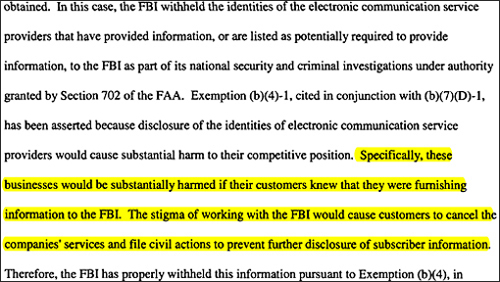
Often when the government tries to suppress information about its surveillance programs, it cites national-security concerns. But not always.
In 2008, a few years after the Bush administration’s warrantless-wiretapping program was revealed for the first time by the New York Times, Congress passed the FISA Amendments Act. That act authorizes the government to engage in dragnet surveillance of Americans’ international communications without meaningful oversight. As we’ve explained before (including in our lawsuit challenging the statute), the FISA Amendments Act is unconstitutional.
In 2009, we also filed a Freedom of Information Act request to learn more about the government’s interpretation and implementation of the FISA Amendments Act. Last November, the government released a few hundred pages of heavily redacted documents. Though redacted, the documents confirmed that the government had interpreted the statute as broadly as we had feared and even that the government had repeatedly violated the few limitations that the statute actually imposed.
Two weeks ago, as part of our FOIA lawsuit over those documents, the government gave us several declarations attempting to justify the redaction of the documents. We’ve been combing through the documents and recently came across this unexpectedly honest explanation from the FBI of why the government doesn’t want us to know which “electronic communication service providers” participate in its dragnet surveillance program. On page 32:

There you have it. The government doesn’t want you to know whether your internet or phone company is cooperating with its dragnet surveillance program because you might get upset and file lawsuits asserting your constitutional rights. Would it be such a bad thing if a court were to consider the constitutionality of the most sweeping surveillance program ever enacted by Congress?
Learn more about surveillance: Subscribe to our newsletter, follow us on Twitter, and like us on Facebook.

